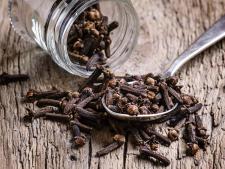-

cloves
| Food | Percentage of DRI per 100 grams | |
|---|---|---|
| manganese | 3024 | |
| vitamin K | 167 | |
| fiber | 143 | |
| iron | 71 | |
| magnesium | 71 | |
| calcium | 71 | |
Cloves are a culinary spice with a strong sweet, warm, and spicy taste and aroma that for many evokes the spirit of Christmas, although they actually grow in tropical climates. Cloves are the unopened flower buds harvested from the evergreen clove tree when they are pink. As they are dried they turn brown and the shape resembles a nail. And in fact, their English name comes from the Latin word clavus, meaning nail.
Cloves are are known for the unique flavor and fragrance they bring to baked goods such as ginger bread, pies, cakes and muffins. But they are also frequently used in savory foods such as pickles, marinades, dressings, stews, soups and vegetable stock. And many spice blends including Garam Masaala and Chinese Five Spice wouldn´t be the same without the warm, sweet addition of clove powder. In great Britain you´ll also find that cloves is an ingredient in the famous Worcester Sauce.
VOLUME
Loud
PH EFFECT
Clove has alkaline properties which helps to ward off effects of excess acid produced in the stomach and gastrointestinal tract.
HOW TO USE
Add early in the cooking process. You can buy whole or ground. The powder looses it´s flavor more quickly, so the best thing is to buy the cloves whole, and use a spice grinder or coffee grinder to easily turn them into a powder. The flavor is intense and can easily become overpowering, so be careful not to add too much.
Cloves can also be taken as a medicine or essential oil. You can find clove capsules, essential oil, tinctures and topical oils and creams with clove at your local health food store.
FLAVOR PAIRINGS
Apples, beets, black pepper, cardamom, chili, cacao, cinnamon, coconut aminos, coconut nectar, coconut sugar, coriander, cranberries, cumin, drinks, fenugreek, ginger, honey, lime, lentils, maple syrup, nutmeg, nuts, onion, orange, pears, pumpkin, rice, sweet potatoes, tamari, tamarind, tea, turmeric, vanilla, winter squash, wine.
SELECTING
When squeezed with a fingernail, good quality cloves will release some of their oil. Alternatively, you can place a clove in a cup of water. Those of good quality will float vertically while those that are stale will either sink or float horizontally. Just like with other dried spices, try to select organically grown cloves since this will give you more assurance that the herb has not been irradiated.
STORING
Cloves should be kept in an air-tight container in a cool, dark and dry place. Ground cloves will keep for about six months, while whole cloves will stay fresh for 1-2 years. Alternatively, you can extend their shelf life by storing them in the refrigerator.
SUBSTITUTIONS
Allspice
HEALTH BENEFITS
With concentrated amounts of vitamins and minerals such as Vitamin K, C, A and B-comples, dietary fiber, iron, manganese, magnesium, calcium, and potassium, cloves are truly a superfood. They have lots of antioxidants that fight off free radicals, supporting immunity and help eliminate toxins.
The oil in clove contains eugenol, a compound with anesthetic, anticeptic, antiviral and anti-inflammatory properties. Eugenol extract is great for dental health, and is even used in dentistry as a component in anaesthetics, disinfectants and mouth wash. The antibacterial abilities of cloves also help with digestion, relieving bloating, constipation and nausea. If you´re feeling stuffed after a meal, clove tea can help ease the discomfort. Simply steep a couple of pieces of cloves in a cup of steaming hot water for 5-10 minutes.
Cloves are also great for alleviating respiratory issues such as cough, pneumonia and asthma as well as headaches and nerve pain.
Studies have found that clove extract is a great for blood circulation and a potent platelet inhibitor, meaning that it can prevent unwanted blood clots from occurring inside the body.
HISTORY
Cloves are native to the Moluccas, formerly known as the Spice Islands of Indonesia. They have been consumed in Asia for more than 2,000 years. Owing to their sweet and fragrant taste, Chinese courtiers dating back to 200 BC would keep them in their mouths in order to freshen their breath when addressing the emperor to not offend him. Arab traders brought cloves to Europe around the 4th century, although they did not come into widespread use until the Middle Ages when they became prized for their pungent flavor that served to mask the taste of poorly preserved foods. While for a long time, they were cultivated almost exclusively in Indonesia, today the leading clove-producing region is Zanzibar in Eastern Africa. In addition to these two regions, cloves are also grown commercially in the West Indies, Sri Lanka, Madagascar, India, Pemba and Brazil.
REFERENCES
- Mateljan, George. The World´s Healthiest Foods. Nov 2020 http://www.whfoods.com/index.php
- Amaechi BT, Higham SM, Edgar WM. Techniques for the production of dental eroded lesions in vitro. J Oral Rehabil 1999 Feb;26(2):97-102. 1999. PMID:12580.
- Ensminger AH, Esminger M. K. J. e. al. Food for Health: A Nutrition Encyclopedia. Clovis, California: Pegus Press; 1986. 1986. PMID:15210.
- Fortin, Francois, Editorial Director. The Visual Foods Encyclopedia. Macmillan, New York. 1996.
- Friedman M, Henika PR, Mandrell RE. Bactericidal activities of plant essential oils and some of their isolated constituents against Campylobacter jejuni, Escherichia coli, Listeria monocytogenes, and Salmonella enterica. J Food Prot 2002 Oct;65(10):1545-60. 2002.
- Wood, Rebecca. The Whole Foods Encyclopedia. New York, NY: Prentice-Hall Press; 1988. 1988. PMID:15220.